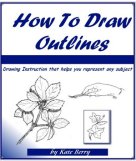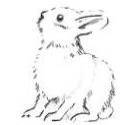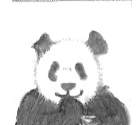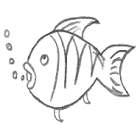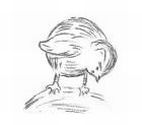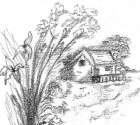Search for images or info
Animal Drawings
These animal drawings are created in a very basic format designed especially for trainee artists. I specialize in simple because it's the best and only way to learn to draw.
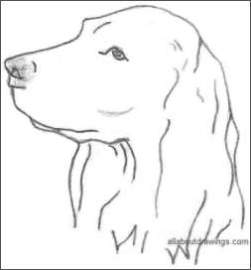
A dog, a bird, a fish, a snake, a fly and worms are all animals. There are almost one million kinds of animals, so you're not likely to get bored with this unlimited range of subjects at your disposal.
The outline of a dog should be an easy template for you to copy. Go on, try it, you'll surprise yourself when you manage a good likeness.
I generally don't like scrawled, scratchy outlines but I have seen some very clever artwork where you can distinctly see what the subject is, even though it's a bunch of scribbly lines! I just haven't mastered that art of using strokes to their full advantage - yet - it's on my to-do list.
It's all a matter of time, practice and how badly we want to succeed. I don't know about you but I am very keen to draw whenever I can and I'm forever collecting great images to copy in my spare time.
I am the type who learns by copying but that may not be the way you want to learn.
I just fell into this way of teaching myself because I went head first into the whole process, without doing any research. I guess my main aim was to see if I could draw first, before making big investments into courses or books.
I really enjoy doing animal drawings, it only takes a bit of concentration to get the outline right and then the rest is easy. You can always use a grid to simplify the task or you could try tracing which shows you how to create the outline.
Once you realize that you can actually draw, it's quite natural to begin thinking about experimenting with pastels and paints. So, if you learn how to draw first, you certainly won't struggle once you move in that direction.
Of course, a lot of people dive straight into painting and there's certainly nothing wrong with that.
If you are an animal lover, you will get great pleasure by illustrating different animals with various mediums.
Knowing the drawing basics is an important requirement but it's certainly not a necessity for any artist, all you have to do is follow your heart.
What interests you the most? You will excel at anything if your desire is strong enough.
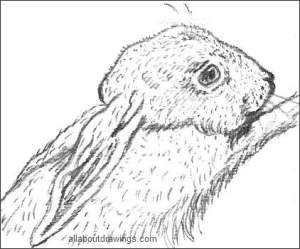
Some Animal Drawing Tips
It's a good idea to start off with mastering outlines before you attempt to create fully detailed animal drawings.
Sometimes it helps if you draw a box around the subject you copy and then draw a box to the same dimensions on your paper. This method assists you as you watch where and how the outline deviates from the sides of the box.
Always check to see if an outline is in proportion first before you concentrate on details or shading.
Categories
Sketches
Instruction
Freebies
Other Areas

** Disclaimer: I receive a small commission if you buy via my links -- at no extra cost to you. **
The How To Sketch Guide
Here's a book that finally dispels the mystery of sketching!
... it only takes a little instruction
or guidance... Read more >>
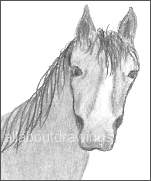
Early Attempt
This is one of my first attempts at adding detail and drawing a horse.
I must have been feeling very confident to try such a complex subject but I guess it's all for the sake of progress.
As I struggled to complete it, I came to realize that I needed to be more observant to be able to properly illustrate eyes and general facial features.
If your outline isn't right, your final image won't be right so it's worth the time to put in a little extra effort at this crucial stage.
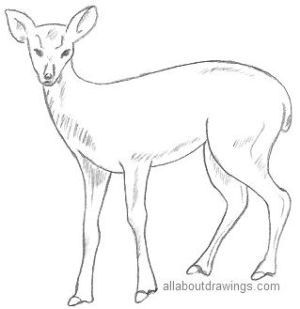
It saves a lot of grief in the long run - I know this because I have already made the mistake of adding details too soon. I hope I can spare you the disappointment.
Proportion and outline are very important so relax and take a moment to scrutinize your initial markings.
It's funny, when I look back on old animal drawings, I realize they are not as good as I thought they were at the time but I continued to be encouraged whenever I managed a reasonable likeness.
Most artists aren't always completely satisfied with every piece they produce.
The longer you look at your artwork, the more things you'll see that need changing - it's the way it is.
The best idea is to declare each piece finished at the appropriate stage and be determined to never re-visit for fiddling purposes.
The animal drawings on this page were produced in 2006 when I had been drawing for one year. I think progress depends on the amount of time available to practice and that's the key.
My turtle illustrations (done in 2011) show that I am now much more confident with a pencil.
Start Simply
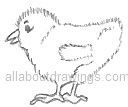
You will often hear that it is best to draw animals from real life. However, if that isn't possible, you can get a good idea from a photo or a book - and don't worry, there is no harm in doing that.
My beginner animal pencil drawings are not that spectacular but they are here for you to grasp the idea of practicing with simple pencil outlines before progressing on to doing all kinds of animal drawings.
You'll soon get a real buzz out of being able to draw so well and from then on there will be no stopping you. You'll catch the drawing bug and good luck to you, too.
It is an amazing pastime and one truly worth exploring.
I have a great little ebook available on Kindle which shows 9 different ways to create a successful outline.
It is really terrific value so don't let the bargain price deceive you.
You can download free reading apps for all different devices.
Now we can access some really great books at low prices.
Click a link below to view various animal illustrations:
Related articles you will enjoy...
* Allaboutdrawings.com is a participant in the Amazon Services LLC Associates Program, an affiliate advertising program designed to provide a means for sites to earn advertising fees by advertising and linking to Amazon.com.
Copyright © 2005 - 2025 www.allaboutdrawings.com. All rights reserved.






